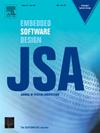平衡隐私和公平:基于差异隐私的联邦学习中的客户端选择
IF 4.1
2区 计算机科学
Q1 COMPUTER SCIENCE, HARDWARE & ARCHITECTURE
引用次数: 0
摘要
联邦学习(FL)通过在保护隐私的同时支持跨客户端的协作模型训练来解决数据孤岛问题。然而,现有的工作大多只关注参数隐私保护,而忽略了模型的训练效率。为此,在本文中,我们提出了AdaDPCS-FL,一种为联邦学习量身定制的自适应预算分配和客户选择方法。该方法分为两步,第一步设计了基于模型相似度的自适应隐私预算分配策略和回归机制,在保持FL中隐私保护的同时加快训练收敛速度。第二步,针对FL过程中客户选择的公平性问题,在考虑客户选择公平性的基础上,提出了基于贡献的在线客户选择机制,其中:一个多武装强盗方案是量身定制的,以优化客户选择。理论上,该方法满足微分隐私性、收敛性保证和累积遗憾0 (KlnRlnR)的恒定上界等性质。在真实数据集上的实验表明,与FedProx和fedag等基线相比,性能更优越。此外,在保证隐私的情况下,与异构环境下的dp - fedag和FedBDP相比,本文方法的测试精度可提高约4%。本文章由计算机程序翻译,如有差异,请以英文原文为准。
Balancing privacy and fairness: Client selection in differential privacy-based federated learning
Federated Learning (FL) tackles the data island problem by enabling collaborative model training across clients while safeguarding privacy. However, most existing work only cared about the parameter privacy protection, while ignoring the model training efficay. To this end, in this paper, we propose AdaDPCS-FL, an Adaptive Budget Allocation and Client Selection method tailored for Federated Learning. This approach consists of two steps, where in the step, an adaptive privacy budget allocation strategy based on model similarity and a reversion mechanism are designed to speed up training convergence while still keeping privacy preservation in FL. In the second step, addressing the fairness of client selection in the FL process, it proposes a contribution-based online client selection mechanism is further proposed with the consideration of the fairness of client selection, in which, a multi-armed bandit scheme is tailored to optimize the client selection. Theoretically, the proposed method satisfies the properties of differential privacy, convergence guarantee, and a constant upper bound on cumulative regret . Experiments on real datasets demonstrate superior performance over baselines like FedProx and FedAvg. Moreover, with the privacy guaranteed, the test accuracy by our proposed method can be improved approximately 4% compared to DP-FedAvg and FedBDP in heterogeneous settings.
求助全文
通过发布文献求助,成功后即可免费获取论文全文。
去求助
来源期刊

Journal of Systems Architecture
工程技术-计算机:硬件
CiteScore
8.70
自引率
15.60%
发文量
226
审稿时长
46 days
期刊介绍:
The Journal of Systems Architecture: Embedded Software Design (JSA) is a journal covering all design and architectural aspects related to embedded systems and software. It ranges from the microarchitecture level via the system software level up to the application-specific architecture level. Aspects such as real-time systems, operating systems, FPGA programming, programming languages, communications (limited to analysis and the software stack), mobile systems, parallel and distributed architectures as well as additional subjects in the computer and system architecture area will fall within the scope of this journal. Technology will not be a main focus, but its use and relevance to particular designs will be. Case studies are welcome but must contribute more than just a design for a particular piece of software.
Design automation of such systems including methodologies, techniques and tools for their design as well as novel designs of software components fall within the scope of this journal. Novel applications that use embedded systems are also central in this journal. While hardware is not a part of this journal hardware/software co-design methods that consider interplay between software and hardware components with and emphasis on software are also relevant here.
 求助内容:
求助内容: 应助结果提醒方式:
应助结果提醒方式:


